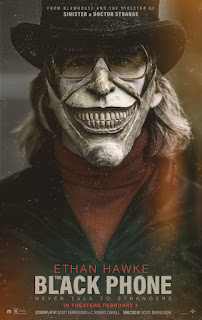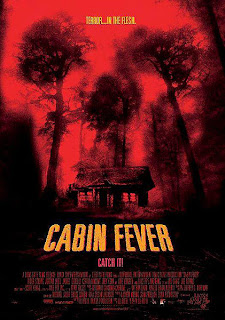"The Black Phone" a solid screamer of '70s nostalgia, friendly ghosts, and a scary Ethan Hawke
The Black Phone (2022)
“The Black Phone” feels like a Stephen King pastiche (or now it’d be “Stranger Things”): teenagers facing the throes of being a teenager before a monster comes along. This time, the monster always remains in human form instead of being child-eating clown Pennywise (or The Demogorgon and his other friends). It’s no coincidence that King—or at least some relation to King—is all over this R-rated, 1978-set horror film, being adapted from a short story by Joe Hill (King’s equally vivid storyteller of a son). Satisfying as a genre picture that isn't just a soulless boo machine, this expertly suspenseful chiller goes further, transcending its skittish horror roots for a cathartic coming-of-age tale.
Playing like director Scott Derrickson’s answer to last year's low-budget thriller “The Boy Behind the Door” with a supernatural twist, "The Black Phone" asks the question, "What if the late victims of a serial kidnapper/killer could help the latest victim-to-be from beyond the grave?" Newcomer Mason Thames is a natural find as Finney Shaw, a 13-year-old boy just trying to survive middle school in North Denver. The bullies are brutal, but the bigger bully is Finney’s abusive, alcoholic P.O.S. father (Jeremy Davies). His precocious, pig-tailed sister Gwen (Madeleine McGraw) gets the brunt of Dad’s beatings. Boys Finney’s age have also gone missing at the hands of child murderer “the Grabber” (Ethan Hawke), and it’s only a matter of time until Finney gets snatched himself. Posing as a traveling magician, “the Grabber” lures Finney into his black “Abracadabra”-emblazoned van with black balloons. When Finney wakes up on a mattress in a drab, soundproofed basement and is visited occasionally by his masked captor, a black (and disconnected) rotary phone rings. He eventually answers it, and it’s not the wrong number, but from other teenage male victims (some of whom Finney knew). Over time, the helpful ghost kids give him advice on how to escape and beat their kidnapper. Meanwhile, Gwen has a sixth sense that could help the police track down “the Grabber” based on what she sees in her dreams.
Writer-director Derrickson and co-writer C. Robert Cargill, who have collaborated together since early Blumhouse horrorfest “Sinister” before going on to Marvel's “Doctor Strange,” find enough organic ways to expand Hill’s simple short story to a feature-length film. The main plot is told efficiently and dynamically as we focus on Finney being resourceful and resilient (with an ace baseball pitching hand) and his benevolent specters coming to his aid, as well as Finney's sister Gwen being proactive. Held together the most by Thames (who proves his emotional authenticity in one single break-down-and-sob moment after several desperate attempts to escape), the film never grows as static as a corded phone. A bigger standout among the young cast is Madeleine McGraw, emotionally honest and a total spitfire as the potty-mouthed Gwen, who begins using her hand-me-down clairvoyance with some prayers to help find her brother.
Director Derrickson establishes a true sense of time and place, from the retro Coors Light beer cans to the mullet hairstyles. There’s a feeling similar to John Carpenter’s “Halloween,” where known danger exists right under these young characters’ noses, and a few visual and narrative Stephen King signposts (like a yellow raincoat that might have fit Georgie and Gwen having “the shine”). The fantastical device of Finney having phone conversations with the once-tough, now-dead boys, all seen standing behind Finney in corpse make-up, sounds hokey on paper. Initially, it is pretty jarring in presentation, almost undercutting the disturbing and harrowing reality. The sight of dead children also deeply echoes “Sinister,” but there is a purpose behind it, tying into Finney’s larger arc from a bullied victim to a brave fighter. The scratchy, atonal score by composer Mark Korven (2019’s “The Lighthouse”) is more than enough to instill dread, but Derrickson delivers a couple of jumpy jolts. The attacks are also cleverly presented as grainy Super 8 home movies (not unlike those camcorder nightmares in “Sinister”).
Screaming “Stranger Danger,” Ethan Hawke cuts an unsettling and unforgettably creepy human monster as “the Grabber.” He’s chilling with the various masks he wears, but also in sly drops of gallows humor and just in simple line readings like, “I just wanted to look at you.” The introduction of a coked-out conspiracy theorist, played by an offbeat James Ransone, relieves some of the tension until turning out to be a bit of a contrivance (though it is cunningly revealed in a technical sense).
Scott Derrickson’s diabolical “Sinister” lived up to its name as one of the most effective fright machines in recent memory. In spite of the equally grim subject matter, "The Black Phone" pays off in a more crowd-pleasing fashion while, most importantly, feeling earned. A whole escape sequence involving a combination lock is as stressful as it gets, and a climactic bit of misdirection is an obvious lift from “The Silence of the Lambs," if still satisfying. “The Black Phone” isn’t quite on that level of "Sinister," nor is it required to be, but it is a solid, attention-holding screamer that finds familiar darkness in ‘70s nostalgia and adolescence.
Grade: B
Universal Pictures is releasing “The Black Phone” (102 min.) in theaters on June 24, 2022.












Comments
Post a Comment